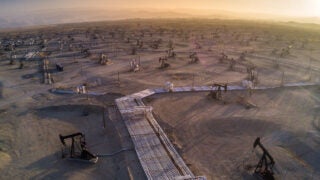- Resources
- PHMSA’s Leak Detection and Repair Proposal Provides a Pipeline for Methane Risk Mitigation
Resources
PHMSA’s Leak Detection and Repair Proposal Provides a Pipeline for Methane Risk Mitigation
Published: June 15, 2023 by Sean Hackett

EDF+Business Senior Manager,
Energy Transition
The past year has seen a slew of historic climate investments and a growing focus among businesses and the finance sector on opportunities in the energy transition. As clean energy grows, risks to the oil and gas industry are evolving at a rapid pace.
Natural gas pipelines are ubiquitous throughout the United States and pipeline leaks are a safety risk, a waste of a valuable energy resource, and a source of methane pollution that accelerates climate change. Leaks can have significant financial consequences in the form of costly shutdowns and cleanup efforts, as well as fines and penalties.
Fortunately, a recent proposal by the US Department of Transportation, Pipeline and Hazardous Materials Safety Administration (PHMSA) to improve pipeline operations and leak management practices would enhance public safety and, according to agency estimates, reduce methane emissions from covered facilities by as much as 55 percent.
While this is a welcome step forward, investors can press for the proposal to go further in limiting the financial risks they face related to pipeline leaks by submitting comments to PHMSA which clearly express support for the proposal and encourage the agency to strengthen key provisions. Investors can also urge their portfolio companies to engage constructively in the rulemaking process.
Methane emissions pose urgent and material risks to oil and gas companies, the financial sector, and capital markets. Through unintended leakage and intentional operational releases, pipeline infrastructure is a major source of methane emissions to the atmosphere. Research has found that these emissions are significantly underestimated and disproportionately impact disadvantaged communities.
As called for by the bipartisan PIPES Act of 2020, PHMSA’s proposal integrates safety and environmental considerations into pipeline leak management and operational standards.
Promisingly, the proposal would:
- Increase the scope and frequency of leak surveys and require faster repair times. Under existing standards, there is no clear timeline for leak repair, allowing operators to leave leaks persisting on their system for years. The proposed standards would require operators to repair almost all leaks within two years and repair many leaks faster than that.
- Require operators to develop Advanced Leak Detection Programs and consider using various commercially available, advanced leak detection technologies. Advanced leak detection technologies such as aerial or vehicle surveys, handheld devices and continuous monitoring systems are more effective than conventional methods at finding and measuring leaks. Leading operators are already using advanced technologies which underscores the cost-effectiveness and technical viability of these common-sense measures.
- Require operators to minimize intentional releases such as equipment venting and blowdowns and consider options for capturing emissions. During pipeline inspection and maintenance, operators conduct blowdowns to relieve pressure by intentionally venting gas to the atmosphere. This results in significant methane emissions and there are cost-effective options for reducing product loss and emissions.
- Increase the availability of pipeline location information and high-quality emissions data. Coupled with comprehensive reporting and mapping requirements, more widespread deployment of advanced leak detection technologies will help investors assess company-specific performance and methane-related risk across the entire industry.
The proposal could be further strengthened by:
- Removing an exemption for repairing leaks on pipe segments that are scheduled to be replaced in the next five years. While PHMSA’s proposal provides a strong framework, allowing known gas leaks to persist for as long as five years can result in significant emissions – especially from older pipelines which tend to be leakier. This is not reasonable to protect safety and the environment. The proposal can be improved by only allowing operators to forego repairs on pipe segments that will be retired or replaced within the following year.
- Adding clear and rigorous requirements for deploying advanced leak detection technology and capturing emissions from intentional releases, rather than simply allowing operators to consider options. To provide greater consistency and certainty and maximize emissions reductions, PHMSA should not leave these important decisions up to the discretion of operators.
- Expanding reporting requirements to ensure that all pipeline mileage is reported to the National Pipeline Mapping System. Under the current proposal, certain types of gathering pipelines are not required to report to the mapping system and this information is needed to help decisionmakers better understand the extent of this infrastructure and whether additional oversight may be needed.
- Requiring operators to report information on hydrogen mixing. Natural gas companies are currently not required to notify regulators when they mix hydrogen into pipeline systems. To maximize transparency and ensure communities are aware, operators should report these operations before they occur.
PHMSA is accepting comments on the proposal until July 17 and comments can be submitted here. Investors should seize this opportunity to support cost-effective and common-sense standards that not only protect communities and climate, but also help mitigate risk across investment portfolios.


